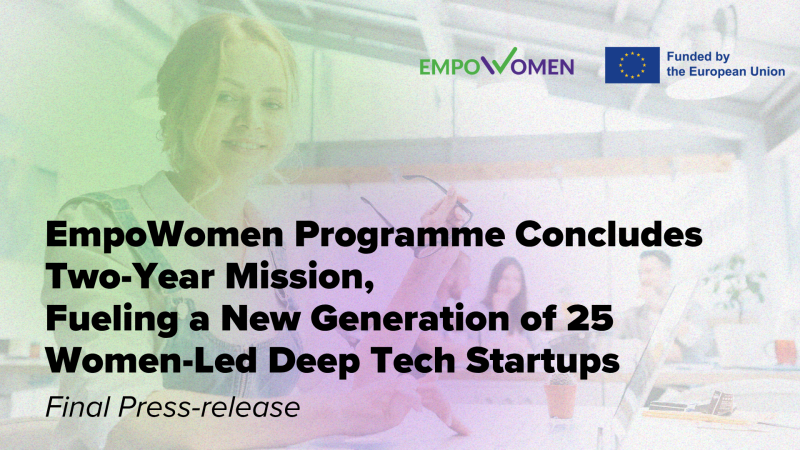
Interview: Natalia Lemarquis, Shin Rai Robotics. How Immersive Tech is Solving the Industrial Skills Gap

The interview with Natalia Lemarquis, founder at Shin Rai Robotics from Poland, creating Robotics and XR-driven automation solutions for manufacturing efficiency.
You can listen to the episode with Natalia Lemarquis on EmpoWomen Podcast:
Or read the interview.
Elevator Pitch
I’m Natalia Lemarquis, founder of Shin Rai Robotics. We are on a mission to increase the potential of people, specifically in the manufacturing and logistics sectors. The manufacturing sector in Europe is struggling; 90% of companies find it difficult to hire and retain skilled labor. We believe the future isn’t about hiring more people, it’s about making people more capable. We are using technology to make it possible to quickly upskill and reskill employees, allowing them to learn new, complex tasks in as little as three minutes. For example, we’ve already taught a regular employee to set up a robotic process in three minutes, which is stunning.
What inspired you to start this journey?
The problem is that European manufacturing is being squeezed by global competition and rapid consumer demand. They need a skilled workforce to adapt, but this often requires 10 years of experience. We want to make this space more inclusive.
My inspiration comes from personal experience. I used to work in manufacturing for jet engine parts and saw these problems firsthand. Companies spend so much time training people, only to have them leave. From an employee’s perspective, it was incredibly difficult to upskill. I had to spend my own time after work to complete courses. Having a guided, immersive toolset like ours would have made it so much easier to gain new skills within my work time, helping myself, the company, and the economy.
How does the technology work?
We developed an immersive toolset that allows you to visually and intuitively program robots, even with no prior knowledge of coding. When you put on the mixed reality (XR) goggles, you see a very intuitive interface that leads you step-by-step through the process. It’s a game-changer for a process that many people are normally afraid of.
Who are your customers and is the solution scalable?
We are B2B, targeting everyone from SMEs to large companies in Europe, with a specific focus on Poland, France, and Denmark. We are originally based in Poland and know that market is growing hugely. We have a demo, have tested it with a business partner, and are now looking to onboard new customers.
While we are starting in manufacturing, our solution is completely sector-agnostic. We plan to move into other verticals, like healthcare—imagine teaching a new nurse how to dress a wound by following an immersive guide. It can also be used to quickly reskill people, for example, moving workers from closing mines into the renewable energy sector. The potential is huge.
What are the biggest challenges you face as a deep-tech founder?
Of course, it’s not plain sailing. Being a deep-tech startup is a challenge in itself. You have to develop the technology, find the right people, and find your first customers. You have to build trust and credibility. For me, a huge challenge was learning to be a salesperson, not just a technical person.
What has your journey as a female founder been like?
It’s not an easy path for anyone, man or woman. But as women, we are definitely less represented. My biggest challenge was that I found myself trying to be like my male colleagues, thinking I had to follow their path to succeed. What I learned is that this is completely wrong. You need to be yourself and forge your own path. You have to find your own style and stay true to your own values. As long as you believe in your product, you will convince people to follow you.
What role has the EmpoWomen program played in your journey?
Programs like EmpoWomen help immensely. They bring in experts to support you. We had numerous mentoring meetings with people who had 10-15 years of experience in their fields. If I needed help with XR development, I had an expert. If I needed help with sales, I had five mentors. The most valuable part was the honest feedback. I could have a meeting with an investor who would tell me, “I wouldn’t invest in you,” but then give me 10 reasons why and how I could improve.
I also learned so much from the peer network. At first, I wondered how I could have anything in common with founders from agriculture or healthcare. But it turned out I learned so much from them, and it was an extremely valuable and unplanned benefit.
What are your next steps and funding strategy?
We were lucky to start with substantial grant funding. Now, our strategy is to secure our customer base. A valuable lesson from EmpoWomen was that it’s never too early to start investor meetings. We are already doing the prep work—pitching and getting feedback—so that when we have our first customer contracts, we will be ready.
Our goal is to acquire at least five customers by the first quarter of next year. By the end of next year, we plan to close a seed round of €850,000 to grow the team and have a fully operational product.
What is your final advice for other women in deep tech?
It’s hard to wrap it up in one piece of advice, but I have two. First, strongly believe in what you are doing. Find a true, deep-from-the-heart reason that will keep you going through all the bad moments. Second, be well-prepared. Evaluate the market, go out there, and don’t be afraid to ask questions and get feedback from everyone—founders, investors, or just a regular person on the street.
***
Subscribe to our social channels LinkedIn, Facebook, X, Instagram to join the vibrant EmpoWomen community, helping female founders of deep tech startups become a new transformative force.

